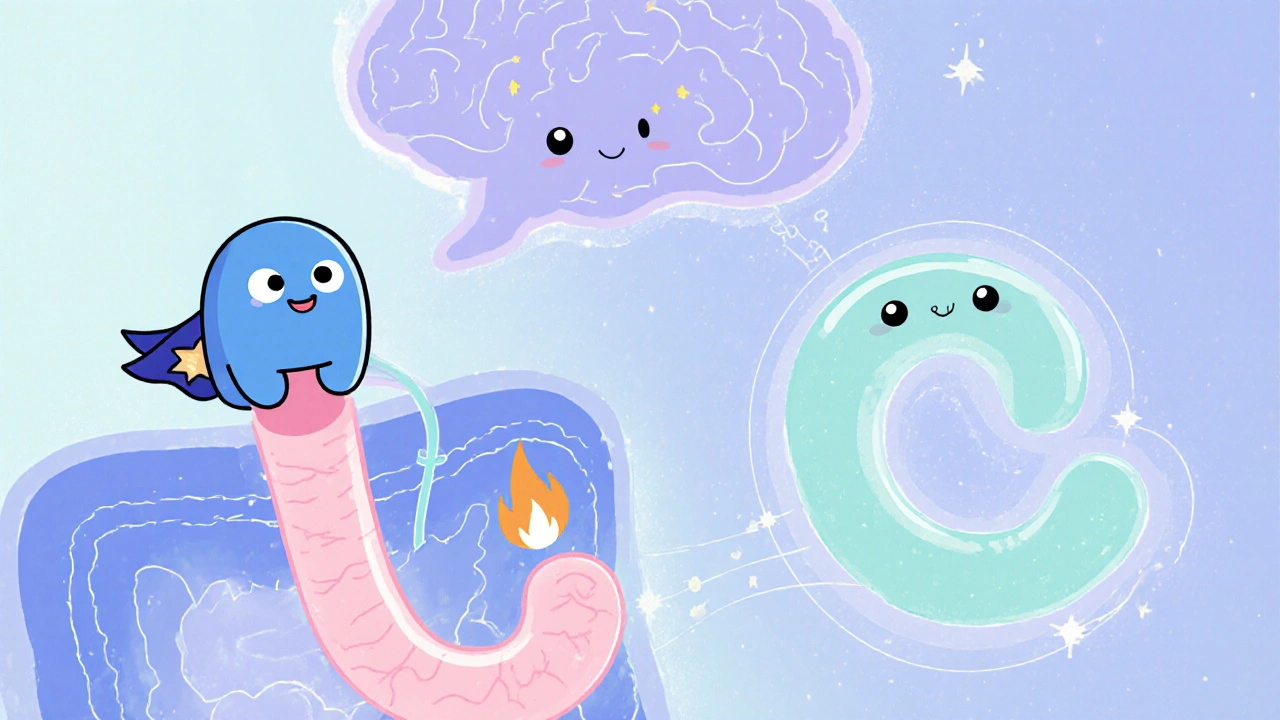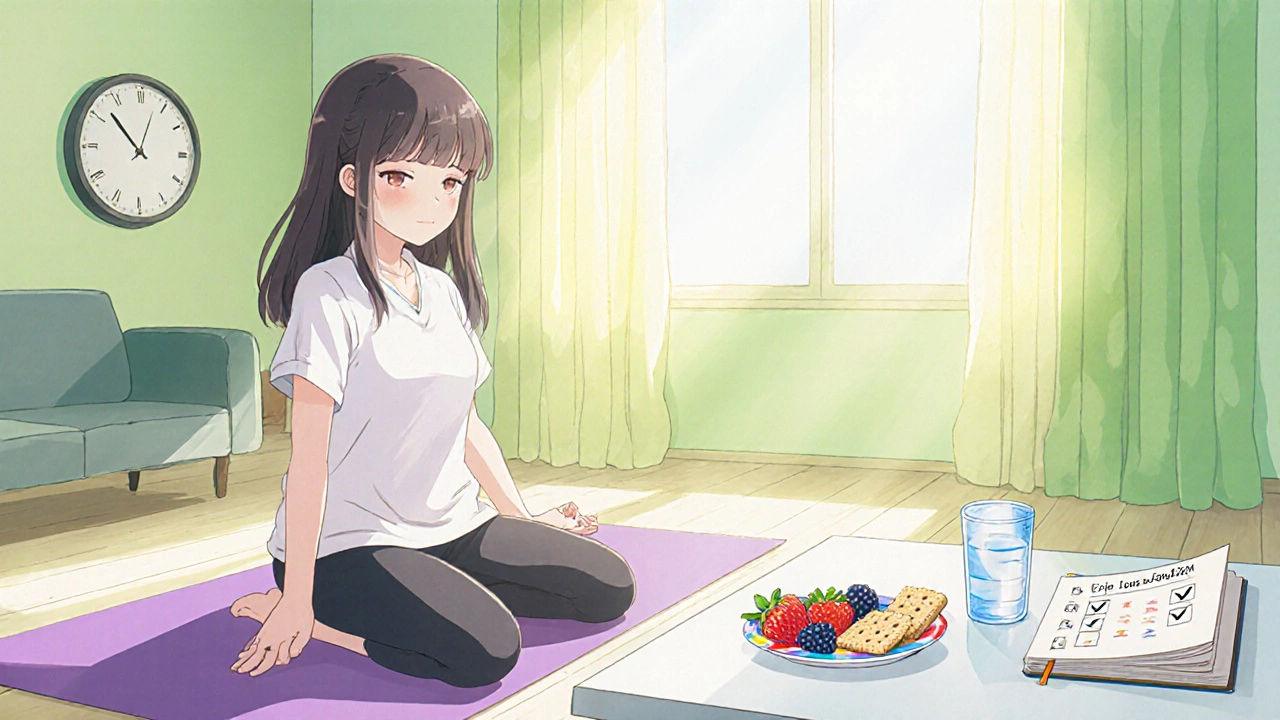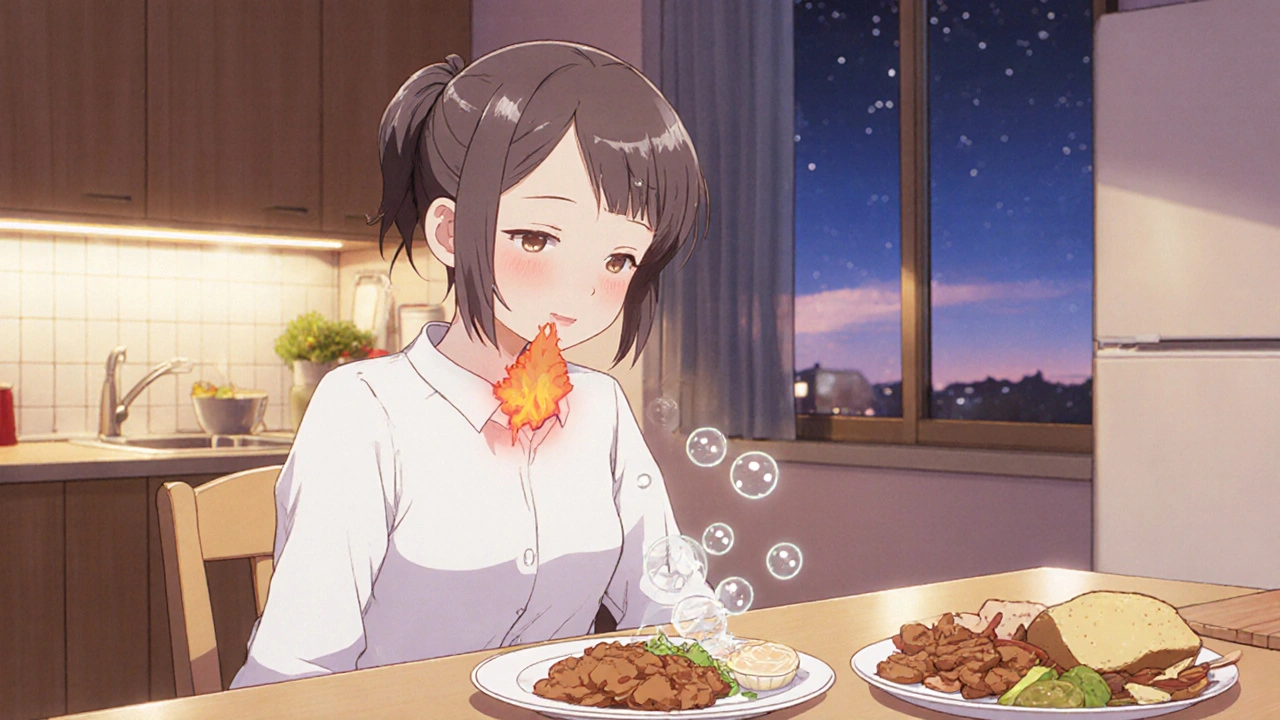When heartburn shows up after a heavy meal and you’re also battling bloating, cramping, or irregular bowel movements, it feels like the two problems are holding hands. But is there a real link between heartburn and Irritable Bowel Syndrome (IBS), or is it just a coincidence? This article untangles the science, points out the overlap, and gives you practical steps to feel better faster.
What's Behind Heartburn?
Heartburn is a burning sensation that rises from the stomach up into the esophagus, often after eating or lying down. The underlying cause is usually gastroesophageal reflux disease (GERD), where stomach acid escapes the lower esophageal sphincter and irritates the lining of the esophagus. Common triggers include fatty foods, caffeine, chocolate, and tight clothing that puts pressure on the abdomen. The body’s natural response-producing more mucus and tightening the sphincter-can only do so much before the discomfort becomes chronic.
Understanding Irritable Bowel Syndrome (IBS)
Irritable Bowel Syndrome (IBS) is a functional gastrointestinal disorder characterized by recurring abdominal pain, bloating, and irregular bowel habits-either diarrhea, constipation, or a mix of both. Unlike inflammatory bowel disease, IBS doesn’t cause permanent damage to the gut, but the symptoms can be just as disruptive. Stress, certain foods, and an imbalance in gut bacteria are frequent culprits.
Why the Symptoms Overlap
Both conditions share a handful of red‑flag symptoms that often make people wonder if they’re dealing with one problem or two.
| Symptom | Heartburn / GERD | IBS | Common to Both |
|---|---|---|---|
| Burning chest discomfort | ✓ | ✓ | |
| Upper abdominal bloating | ✓ | ✓ | |
| Regurgitation of food | ✓ | ||
| Diarrhea | ✓ | ||
| Constipation | ✓ |
The overlaps aren’t accidental. Researchers have found that the esophagus and the lower gastrointestinal tract share similar nerve pathways, especially the vagus nerve, which regulates digestion and pain perception. When one part of the gut is irritated, the signal can travel upstream and make the other part feel uncomfortable.

Physiological Links Between Heartburn and IBS
Three main mechanisms explain why the two often co‑occur:
- Visceral hypersensitivity: People with IBS typically have an over‑reactive gut lining that amplifies normal sensations. The same heightened sensitivity can make the esophagus react strongly to small amounts of acid, resulting in heartburn.
- Gut microbiome disruption: A study from 2023 showed that IBS patients often have an altered gut microbiome, which can affect the production of short‑chain fatty acids that influence esophageal sphincter tone.
- Stress and the brain‑gut axis: Chronic stress triggers cortisol release, which relaxes the lower esophageal sphincter and speeds up gut motility-both prime conditions for reflux and IBS flare‑ups.
Other contributors worth mentioning include:
- Proton pump inhibitors (PPIs)-while they tame acid, long‑term use can shift bacterial balance and may worsen IBS symptoms.
- Helicobacter pylori (H. pylori) infection, which can irritate the stomach lining and increase the likelihood of reflux.
- Dietary triggers such as caffeine, alcohol, and high‑fat meals, which simultaneously provoke acid production and gut motility changes.
Practical Lifestyle Strategies
If you suspect both conditions are playing a role, adjusting everyday habits can bring relief without immediately reaching for medication.
1. Adopt a Low FODMAP Approach
The low FODMAP diet reduces fermentable carbs that feed gas‑producing bacteria. Many IBS sufferers see a 30‑50% drop in bloating within two weeks, and the reduced pressure on the stomach can also lower the chance of reflux.
2. Time Your Meals
Avoid eating within three hours of bedtime. Give the stomach time to empty, which lowers the pressure that forces acid up the esophagus. Small, frequent meals are easier on both the esophagus and the intestines.
3. Mind Your Triggers
Keep a simple food‑symptom diary for two weeks. Mark any episodes of heartburn, bloating, or changes in stool. Common culprits include:
- Spicy foods
- Chocolate and mint
- Carbonated beverages
- Large fatty meals
4. Manage Stress
Because the brain‑gut axis is a two‑way street, techniques like deep‑breathing, yoga, or short daily walks can lower cortisol levels, relax the sphincter, and calm intestinal spasms.
5. Review Medications
If you’re on a daily proton pump inhibitor (PPI) for heartburn, discuss dose reduction with your doctor. Short‑term use (up to 8 weeks) is usually safe, but longer periods may affect gut flora and worsen IBS.

When to See a Healthcare Professional
Even with the best home plan, some red‑flag signs need prompt evaluation:
- Unexplained weight loss or loss of appetite
- Difficulty swallowing or persistent vomiting
- Blood in vomit or stool
- Sudden change in bowel habits after age 50
Doctors may order tests such as an upper endoscopy to rule out ulcer disease, or a breath test for small intestinal bacterial overgrowth (SIBO), which can mimic both heartburn and IBS.
Quick Checklist: Managing Both Conditions
- Track foods and symptoms for at least 14 days
- Shift to smaller, earlier meals
- Try a low FODMAP trial (4‑6 weeks)
- Use antacids only when needed; avoid daily PPIs without doctor guidance
- Incorporate daily stress‑reduction practice
Following this checklist can reduce flare‑ups, improve quality of life, and give you concrete data to discuss with your clinician.
Can heartburn cause IBS?
Heartburn itself doesn’t cause IBS, but the shared nerve pathways and stress response can make both conditions appear together. Treating one often eases the other.
Are PPIs safe for people with IBS?
Short‑term PPIs are generally safe, but long‑term use may alter gut microbiota, potentially worsening IBS symptoms. Talk to your doctor about the lowest effective dose and duration.
What foods trigger both heartburn and IBS?
High‑fat meals, chocolate, caffeine, carbonated drinks, and spicy foods can relax the esophageal sphincter and ferment in the gut, causing reflux and bloating simultaneously.
Is the low FODMAP diet suitable for heartburn?
Low FODMAP reduces gas‑producing carbs, easing abdominal pressure, which can indirectly lower reflux episodes. It’s not a direct heartburn cure but often helps both conditions.
When should I get an endoscopy?
If heartburn persists despite over‑the‑counter treatment, or if you notice bleeding, difficulty swallowing, or unexplained weight loss, an upper endoscopy helps rule out ulcers, Barrett’s esophagus, or cancer.

parbat parbatzapada
October 21, 2025 AT 17:21i keep seeing secret trials where they test heartburn meds on IBS patients just to sell more pills-totally a covert profit scheme.
Casey Cloud
October 30, 2025 AT 07:07Heartburn and IBS often share underlying mechanisms, so treating one can improve the other. The vagus nerve creates a two‑way street between the esophagus and the colon. When the gut becomes hypersensitive, even a small amount of acid can trigger a burning sensation. Likewise, stress hormones relax the lower esophageal sphincter, allowing reflux. Many patients report that low‑FODMAP diets reduce both bloating and reflux episodes. Cutting out high‑fat meals also lessens pressure on the stomach, which helps keep acid down. Probiotic supplements can rebalance the microbiome, potentially easing IBS symptoms. However, probiotic strains vary, so choose a multi‑strain product with scientific backing. It’s wise to keep a food‑symptom diary for at least two weeks; this data guides your doctor. If you’re on a proton pump inhibitor, discuss tapering after eight weeks to avoid gut flora disruption. Regular moderate exercise improves gut motility and reduces stress‑induced reflux. Mindful breathing exercises before meals can calm the nervous system. Elevating the head of the bed by six inches reduces nighttime reflux. Avoid lying down for at least three hours after eating, especially heavy meals. Hydration is key, but sip water rather than gulp large volumes during meals. Finally, schedule a follow‑up with a gastroenterologist if symptoms persist despite lifestyle changes.
Kathrynne Krause
November 7, 2025 AT 21:53Imagine your gut as a bustling market where every spice, stressor, and sigh negotiates a deal; when the tea of anxiety brews, both heartburn and IBS flare like fireworks. Embrace the power of a low‑FODMAP adventure, letting your body discover calm horizons. Celebrate each small victory-no more midnight heartburn, smoother bowel rhythm-these are the bright beads on your wellness necklace. Keep dancing with your nutrition, and the gut will hum a happier tune.
Chirag Muthoo
November 16, 2025 AT 12:39It is essential to approach the overlap of gastro‑oesophageal reflux and irritable bowel syndrome with a methodical plan. Begin by documenting meals and symptom timing in a structured ledger for at least fourteen days. Consult a healthcare professional to assess the necessity of endoscopic evaluation, especially if alarm features arise. Adopting smaller, earlier meals alongside stress‑reduction techniques can modestly alleviate both conditions.
Kimberly Lloyd
November 25, 2025 AT 03:26In many traditions, the digestive fire is seen as a reflection of inner balance; when thoughts churn, the stomach responds with both flame and turbulence. Observing this interplay invites us to honor our bodies with mindful eating and quiet contemplation. A gentle low‑FODMAP trial may serve as a modern rite of passage toward tranquility. By listening to the subtle cues of hunger and comfort, we weave respect for self into daily practice.
Sakib Shaikh
December 3, 2025 AT 18:12Listen up folks! The science is crystal clear-your gut’s nervous system is a hyper‑wired super‑highway, and you’re basically driving a monster truck on it! Every greasy burger you shove down fuels the acid reflux factory, while the same reckless diet feeds the bloating brigade in your colon. PPIs might silence the heartburn drums, but they also throw the microbiome into chaos, spawning a IBS after‑party you didn’t RSVP to! So quit the nonsense, grab a low‑FODMAP guide, and shut down the chaos before it erupts into a full‑blown gastrointestinal war!!!
Devendra Tripathi
December 12, 2025 AT 08:58Everyone loves to pair heartburn with IBS as if it’s the obvious duo, but the truth is far more nuanced. Not every reflux sufferer has hypersensitivity, and not every IBS patient experiences acid spikes. Blaming stress for everything is an over‑simplified narrative that ignores genetic predispositions. Moreover, the blanket recommendation of low‑FODMAP disregards individual carbohydrate tolerance thresholds. It’s time we stop mass‑applying one‑size‑fits‑all diets and start demanding personalized assessments from clinicians.
Vivian Annastasia
December 20, 2025 AT 23:44Oh great, another article telling us to “track your food” like we’re all secret agents of our own bowels. As if a simple diary can untangle the complex web of microbiome politics and corporate pharma plots. Sure, jotting down meals sounds helpful, but it also opens the door for endless self‑blame when the symptoms persist. Perhaps the real cure is a massive conspiracy to keep us dependent on overpriced meds.
John Price
December 29, 2025 AT 14:30Those practical tips line up perfectly with what I've seen work for me.
Nick M
January 7, 2026 AT 05:16While the dramatic flair is entertaining, the actual evidence points to modest dietary adjustments rather than a “gastrointestinal war”.
eric smith
January 15, 2026 AT 20:02Actually, tracking meals is a cornerstone of evidence‑based gastroenterology, not some paranoid surveillance scheme.
Erika Thonn
January 24, 2026 AT 10:49if the gut is a market, then the heartburn is the fire that burns the stalls of our thoughts, a reminder that inner chaos often mirrors outer discomfort.
Ericka Suarez
February 2, 2026 AT 01:35Our heritage teaches us to respect the body, not bow to foreign diet trends; trust the ancient spices of our land to calm the fire, not some Western low‑FODMAP fad.
Jake Hayes
February 10, 2026 AT 16:21Devendra, your nuance is noted, but the clinical data still supports a strong association between reflux hypersensitivity and IBS symptom amplification.